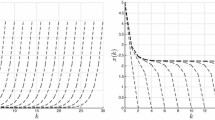Abstract
A neighborhood turnpike theorem is proved for continuous-time, infinite-horizon optimization models with positive discounting. Our approach is a primal one and no differentiability assumption is made. The basic hypothesis is a condition of uniform concavity at the point defining the undiscounted steady state. The main novelty here is that we formulate the theorem by taking the undiscounted steady state as the turnpike.
Similar content being viewed by others
References
McKenzie, L. W., Turnpike Theory, Econometrica, Vol. 49, pp. 679–711, 1976.
Cass, D., and Shell, K., The Structure and Stability of Competitive Dynamical Systems, Journal of Economic Theory, Vol. 12, pp. 31–70, 1976.
Rockafellar, T. R., Saddle Points of Hamiltonian Systems in Convex Lagrange Problems Having a Nonzero Discount Rate, Journal of Economic Theory, Vol. 12, pp. 71–113, 1976.
Scheinkman, J. A., On Optimal Steady States of n-Sector Growth Models When Utility Is Discounted, Journal of Economic Theory, Vol. 12, pp. 11–30, 1976.
Brock, W. A., and Scheinkman, J. L., Global Asymptotic Stability of Optimal Control Systems with Application to the Theory of Economic Growth, Journal of Economic Theory, Vol. 12, pp. 164–190, 1976.
Montrucchio, L., A Turnpike Theorem for Continuous-Time Optimal Control Models, Journal of Economic Dynamics and Control, Vol. 5, pp. 371–382, 1995.
Boldrin, M., and Montrucchio, L., On the Indeterminacy of Capital Accumulation Paths, Journal of Economic Theory, Vol. 40, pp. 26–36, 1986.
Sorger, G., On the Optimality of Given Feedback Controls, Journal of Optimization Theory and Applications, Vol. 65, pp. 321–329, 1990.
Montrucchio, L., Dynamical Systems That Solve Continuous-Time Concave Optimization Problems: Anything Goes, Cycles and Chaos in Economic Equilibrium, Edited by J. Benhabib, Princeton University Press, Princeton, New Jersey, pp. 277–288, 1992.
Montrucchio, L., Dynamic Complexity and Discount Factors for Strongly Concave Problems, Journal of Optimization Theory and Applications, Vol. 80, pp. 385–406, 1994.
Montrucchio, L., and Sorger, G., Topological Entropy of Policy Functions in Concave Dynamic Optimization Models, Journal of Mathematical Economics, Vol. 25, pp. 181–194, 1996.
McKenzie, L. W., A Primal Route to the Turnpike and Lyapunov Stability, Journal of Economic Theory, Vol. 27, pp. 194–209, 1982.
McKenzie, L. W., Optimal Economic Growth and Turnpike Theorems, Handbook of Mathematical Economics, Edited by K. J. Arrow and M. Intriligator, North-Holland, Amsterdam, Holland, Vol. 3, pp. 1281–1355, 1986.
Nishimura, K. G., A New Concept of Stability and Dynamical Economic Systems, Journal of Economic Dynamics and Control, Vol. 6, pp. 25–40, 1983.
Montrucchio, L., The Neighborhood Turnpike Property for Continuous-Time Optimal Growth Models, Ricerche Economiche, Vol. 48, pp. 213–224, 1994.
Donchev, A. L., and Zolezzi, T., Well-Posed Optimization Problems, Lecture Notes in Mathematics, Springer Verlag, Berlin, Germany, Vol. 1543, 1993.
Khan, A. M., and Mitra, T., On the Existence of a Stationary Optimal Stock for a Multi-Sector Economy: A Primal Approach, Journal of Economic Theory, Vol. 40, pp. 319–328, 1986.
Fenstein, C. D., and Luenberger, D. G., Analysis of the Asymptotic Behavior of Optimal Control Trajectories: The Implicit Programming Problem, SIAM Journal on Control and Optimization, Vol. 19, pp. 561–585, 1981.
Baum, R. F., Existence Theorems for Lagrange Control Problems with Unbounded Time Domain, Journal of Optimization Theory and Applications, Vol. 19, pp. 89–116, 1976.
Bates, G. R., Lower Closure and Existence Theorems for Optimal Control Problems with Infinite Horizon, Journal of Optimization Theory and Applications, Vol. 24, pp. 639–649, 1978.
Takekuma, S. I., A Sensitivity Analysis on Optimal Economic Growth, Journal of Mathematical Economics, Vol. 7, pp. 193–208, 1980.
Ekeland, I., and Turnbull, T., Infinite-Dimensional Optimization and Convexity, Chicago Lectures in Mathematics, The University of Chicago Press, Chicago, Illinois, 1983.
Sorger, G., Minimum Impatience Theorems for Recursive Economic Models, Lecture Notes in Economics and Mathematical Systems, Springer Verlag, Berlin, Germany, Vol. 390, 1992.
Rockafellar, T. R., Convex Analysis, Princeton University Press, Princeton, New Jersey, 1970.
Author information
Authors and Affiliations
Rights and permissions
About this article
Cite this article
Marena, M., Montrucchio, L. Neighborhood Turnpike Theorem for Continuous-Time Optimization Models. Journal of Optimization Theory and Applications 101, 651–676 (1999). https://doi.org/10.1023/A:1021794221688
Issue Date:
DOI: https://doi.org/10.1023/A:1021794221688




